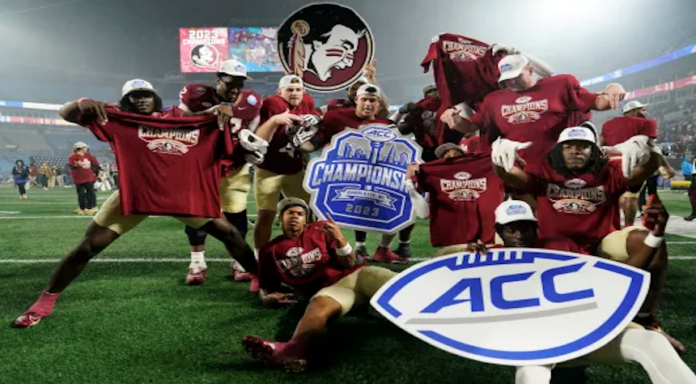The fact that Florida State University’s (FSU) Seminoles, the Atlantic Coast Conference (ACC), champions of 2023-24, were excluded from the College Football Playoffs was one of the most dominant stories of the season. Because so many players chose to opt out of the Orange Bowl before it, we’ll never be able to tell how bad the decision was. The team’s performance in the postseason isn’t an accurate representation of what the Seminoles would have done if they had made the playoffs.
Now, FSU and ACC are suing each other. Florida State’s rights are granted by the ACC until 2036. In the age of realignment conferences, that’s a long time. FSU wants a test run to see what other conference offers.
In the week leading up to Christmas, both entities filed suits against each other. On Dec. 21, the ACC filed first, and FSU followed a few days later. FSU released a press release that stated:
…the ACC failed to meet its stated obligations of “generating substantial revenue” and “maximizing athletic opportunities” for members. The report details how the ACC mishandled negotiations with ESPN, denying its members tens or even hundreds of millions of dollars in revenue each year and putting them in a competitive position behind other Power Four Schools in terms of educational advancement and athletic championships.
The lawsuit claims that rather than fixing these problems, the ACC tried to stop its members from leaving by threatening them with “draconian withdrawal penalties” of at least 572 million dollars — the most onerous penalty in collegiate athletics.
This week the divorce proceedings between FSU & the ACC became more complicated. Stewart Mandel of The Athletic reports that the ACC wants to stop Florida State from taking part in conference affairs because FSU is trying to withdraw its rights.
In its amended lawsuit, the ACC alleges that Florida State breached confidentiality by disclosing details of the agreement between the conference and ESPN at a trustees meeting. The conference says that such violations of confidentiality have been occurring for many years.
The ACC’s amended lawsuit against FSU today includes four new claims for relief. It alleges FSU violated confidentiality agreements by showing details of the ESPN deal in that BOT meeting.
There’s also this doozy. pic.twitter.com/Gw88XD0Y8w
— Stewart Mandel (@slmandel) January 17, 2024
This dispute is all about money, just like everything else that happens in college football today. You’re probably shocked.
Mandel explains that the dispute is a result of Florida State’s dissatisfaction over the ACC’s 2016 media rights agreement with ESPN. The school claims this deal will cause a revenue deficit of $30 million annually with its competitors in the Big Ten or SEC.
FSU is taking its fight to court because it could face $572 million of penalties if it leaves the ACC. The trustees think that the hundreds millions of dollars that would be required to leave the ACC is “draconian.”
Florida State isn’t the only one looking for more ACC funding or a way to leave. Clemson and Miami have also been involved in the discussions to try to leave the conference by 2036. The schools have agreed to work together with the ACC in order to develop new revenue streams after the spring conference.
FSU has been the only school that has taken the ACC to trial. We may see more fights in the ACC’s future if other schools are waiting to see what happens with the Florida State lawsuit. In modern college football, money is king.










